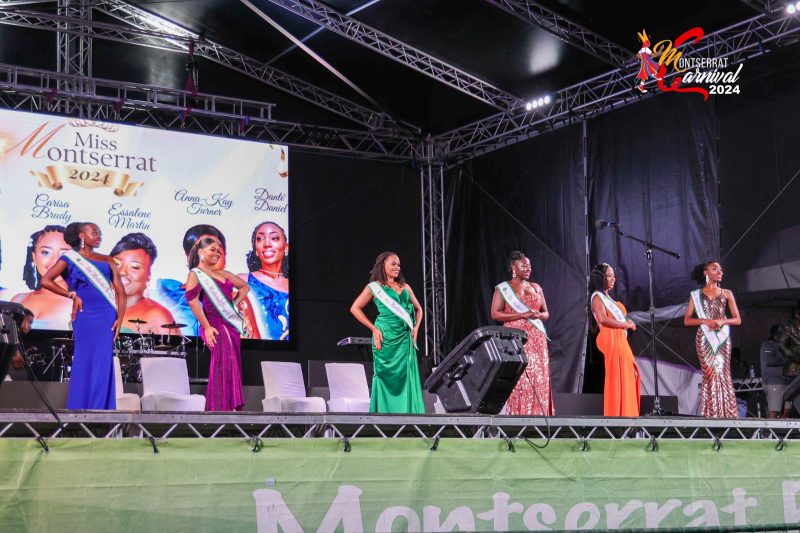Livestock farmers here are being encouraged to take more responsibility for the health and raring of their animals.
This was one of the messages shared by officials from the Department of Agriculture, during its Livestock Farmers Forum on Wednesday, June 7, 2023 at the Montserrat Cultural Centre.

Led by Dr. Selwyn Maloney, the Head of Veterinary Medicine and acting Director of Agriculture in the Ministry of Agriculture, Housing and the Environment (MALHE), the forum gave farmers an opportunity to share their concerns and also to learn about initiatives by the department to promote the increased production of large animals, as well as pigs, sheep, goats and chickens.
Dr. Maloney told the gathering of more than 30 farmers that the Department of Agriculture wants Montserrat to reach to a state where broiler imports are kept to the minimum. The goal is to help farmers increase their production of chickens to be packaged as breast, legs, and other parts.
“Based on feedback, slaughtering is the problem,” shared the veterinarian. He added that the department is looking at improving the current facility and they have written up a project to source funding for this.
“It would be good to see Montserrat-branded chicken on the market,” said Dr. Maloney.
Currently the department provides free veterinary services to all livestock farmers on the island. Farmers also benefit from being able to import equipment and other supplies necessary for operation without any customs duties.
Dr. Maloney said that they want to offer artificial insemination as a more cost-effective method for farmers to obtain new breeds of animals.

The 2020 roll out of this programme was stalled due to COVID. August 2023 is the new start date for offering artificial insemination for small ruminants and pigs.
The official went on to explain that the department is aware of the high cost of importing livestock into Montserrat, especially breeds coming in from the USA, Australia and Africa. These can range between XCD 15,000 to 20,000 per animal, the vet added.
Understanding that farmers were looking for shorter growth periods and quicker returns by importing high value males, artificially inseminating local animals would help to keep these costs down. The local breeds are mongrels, he explained and take a long time to get to market weight.
The department also offers farmers goat stud services at its Livestock Station in Barzeys. The local market is not producing enough goat meat for the demand and it is an industry that continues to grow, Maloney told the gathering. The cost of importing a male goat can cost about XCD10,000. Improved breeds of baby goats birthed at the Barzeys station are sold to farmers at a cheaper rate.
Another service that the department offers is the provision of fence wires for keeping animals enclosed.
 Several concerns raised by farmers were the high cost of feed for chickens, inconsistent availability of medicines for animals at the veterinary office, inadequate veterinary support from the department, and the theft of livestock.
Several concerns raised by farmers were the high cost of feed for chickens, inconsistent availability of medicines for animals at the veterinary office, inadequate veterinary support from the department, and the theft of livestock.
The Agriculture director said that pre-COVID the cost of a container of feed from Grenada was XCD4500. This went up to over 10,000 during the pandemic blamed on increased fuel and shipping costs, and the Ukraine invasion. However, he noted, the cost of shipping and feed are not coming down despite the decrease in fuel costs and other factors.
Dr. Maloney said workshops are conducted at livestock station and the extension officers regularly communicate with farmers on best practices for farming smart and in an economical way. He emphasised that the security of animals was the responsibility of farmers.
Crimes of praedial larceny should be reported to the police.
Farmers were reminded to protect their animals by conducting regular health checks to reduce losses. They were also encouraged to obtain the free treatments for internal and external parasites. They were also made aware of the Animal Trespass and Pound Act which states that they can be fined and jailed if their animals caused damage to other people’s property, including crops. A Crop Protection Team is to be hired to round up loose livestock.
“Farmers have massive responsibility to care for their animals as we are providing the medication for free,” said Dr. Maloney.
Farmers encouraged each other to do more for themselves rather than wait on government. There was also a call to either get involved in the Farmers’ Association which has primarily focused on crop production or start a livestock farmers group.
Farmer Derrick Lee shared a new initiative to promote the quality of animals being raised on island. A Livestock Showcase is scheduled for Sunday, August 6 at Old Road Bay. There will be prizes for various categories including the Claude Hogan Trophy for the Best Groomed animal and the RTM Trophy for the winner of the goat race.
Lee said that farmers on Antigua have shown an interest in the event and several will be sending animals for the showcase.
Registration to enter is $20.







